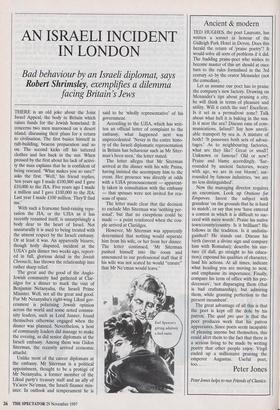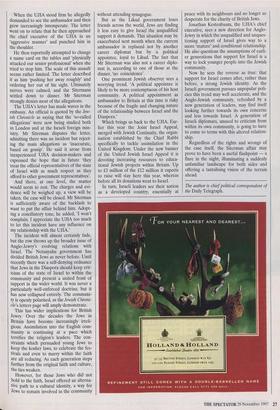AN ISRAELI INCIDENT
IN LONDON
Bad behaviour by an Israeli diplomat, says
Robert Shrimsley, exemplifies a dilemma
facing Britain's Jews
THERE is an old joke about the Joint Israel Appeal, the body in Britain which raises funds for the Jewish homeland. It concerns two men marooned on a desert island, discussing their plans for a return to civilisation. The first busies himself in raft-building, beacon preparation and so on. The second kicks off his tattered clothes and lies back in the sun. When pressed by the first about his lack of activi- ty the man explains that he is confident of being rescued. 'What makes you so sure?' asks the first. 'Well,' his friend replies, `ten years ago I made £100,000 and I gave £10,000 to the JIA. Five years ago I made a million and I gave £100,000 to the JIA. Last year I made £100 million. They'll find me.'
With such a fearsome fund-raising repu- tation the JIA, or the UJIA as it has recently renamed itself, is unsurprisingly a body dear to the heart of Israel. Not unnaturally it is used to being treated with the utmost respect by the Israeli embassy. Or at least it was. An apparently bizarre, though hotly disputed, incident at the UJIA's gala dinner two weeks ago, report- ed in full, glorious detail in the Jewish Chronicle, has thrown the relationship into rather sharp relief.
The great and the good of the Anglo- Jewish community had gathered at Clar- idges for a dinner to mark the visit of Benjamin Netanyahu, the Israeli Prime Minister. Well, not all the great and good. For Mr Netanyahu's right-wing Likud gov- ernment is polarising Jewish opinion across the world and some noted commu- nity leaders, such as Lord Janner, found themselves otherwise engaged when the dinner was planned. Nevertheless, a host of community leaders did manage to make the evening, as did senior diplomats at the Israeli embassy. Among them was Gidon Siterman, the recently arrived economic attaché.
Unlike most of the career diplomats at the embassy, Mr Siterman is a political appointment, thought to be a protégé of Mr Netanyahu, a former member of the Likud party's treasury staff and an ally of Ya'acov Ne'eman, the Israeli finance min- ister. In outlook and temperament he is said to be 'wholly representative' of his government.
According to the UJIA, which has writ- ten an official letter of complaint to the embassy, what happened next was unprecedented. 'Never in the entire histo- ry of the Israeli diplomatic representation in Britain has behaviour such as Mr Siter- man's been seen,' the letter stated.
The letter alleges that Mr Siterman arrived at the dinner with his wife Pnina, having insisted she accompany him to the event. Her presence was directly at odds with a UJIA pronouncement — apparent- ly taken in consultation with the embassy — that spouses were not invited for rea- sons of space.
The letter made clear that the decision to exclude Mrs Siterman was 'nothing per- sonal', but that no exceptions could be made — a point reinforced when the cou- ple arrived at Claridges.
However, Mr Siterman was apparently determined that nothing would separate him from his wife, or her from her dinner. The letter continued, 'Mr Siterman pushed himself into the room and announced to our professional staff that if his wife was not seated he would "ensure" that Mr Ne'eman would leave.' When the UJIA stood firm he allegedly demanded to see the ambassador and then grew increasingly intemperate. The letter went on to relate that he then approached the chief executive of the UJIA in an `aggressive manner' and punched him in the shoulder.
He then reportedly attempted to change a name card on the tables and 'physically attacked our senior professional' when she tried to stop him. The scale of this assault seems rather limited. The letter described it as him 'pushing her away roughly' and ordering her out of his sight. Ultimately nerves were calmed, and the Sitermans settled down to dinner. Mr Siterman strongly denies most of the allegations.
The UJIA's letter has made waves in the embassy. An official is quoted by the Jew- ish Chronicle as saying that the 'so-called allegations' were now being studied both in London and at the Israeli foreign min- istry. Mr Siterman disputes the letter, admitting there was an incident but reject- ing the main allegations as 'inaccurate, based on gossip'. He said it arose from inexperienced UJIA decision-makers and expressed the hope that in future 'they treat the official representatives of the state of Israel with as much respect as they afford to other government representatives'.
And there, at one level, the matter would seem to rest. The charges and evi- dence will be weighed up, a view will be taken, the case will be closed. Mr Siterman is sufficiently aware of the backlash to want to put the affair behind him. Adopt- ing a conciliatory tone, he added, 'I won't complain. I appreciate the UJIA too much to let this incident have any influence on my relationship with the UJIA.'
The incident will almost certainly fade, but the row throws up the broader issue of Anglo-Jewry's evolving relations with Israel. The Netanyahu government has divided British Jews as never before. Until recently there was a self-denying ordnance that Jews in the Diaspora should keep crit- icism of the state of Israel to within the community and present a united front of support in the wider world. It was never a particularly well-enforced doctrine, but it has now collapsed entirely. The communi- ty is openly polarised, as the Jewish Chroni- cle's letters page will amply demonstrate.
This has wider implications for British Jewry. Over the decades the Jews in Britain have become increasingly irreli- gious. Assimilation into the English com- munity is continuing at a pace which terrifies the religion's leaders. The con- straints which persuaded young Jews to keep the kosher laws, to celebrate the fes- tivals and even to marry within the faith are all reducing. As each generation steps further from the original faith and culture, the ties weaken.
However, for those Jews who did not hold to the faith, Israel offered an alterna- tive path to a cultural identity, a way for Jews to remain involved in the community without attending synagogue.
But as the Likud government loses friends across the world, Jews are finding it less easy to give Israel the unqualified support it demands. This situation may be exacerbated next month when the current ambassador is replaced not by another career diplomat but by a political appointee, loyal to Likud. The fact that Mr Siterman was also not a career diplo- mat is, according to one of those at the dinner, 'no coincidence'.
One prominent Jewish observer sees a worrying trend. 'A political appointee is likely to be more contemptuous of his host community. A political appointment as ambassador to Britain at this time is risky because of the fragile and changing nature of the relationship between Israel and the Diaspora.'
Which brings us back to the UJIA. Ear- lier this year the Joint Israel Appeal, merged with Jewish Continuity, the organ- isation established by the Chief Rabbi specifically to tackle assimilation in the United Kingdom. Under the new banner of the United Jewish Israel Appeal it is devoting increasing resources to educa- tional Jewish projects within Britain. Up to £3 million of the £12 million it expects to raise will stay here this year, whereas before all its donations went to Israel.
In turn, Israeli leaders see their nation as a developed country, essentially at peace with its neighbours and no longer so desperate for the charity of British Jews.
Jonathan Kestenbaum, the UJIA's chief executive, sees a new direction for Anglo- Jewry in which the unqualified and unques- tioning support of Israel gives way to a more 'mature' and conditional relationship. He also questions the assumptions of earli- er generations that support for Israel is a way to lock younger people into the Jewish community.
Now he sees the reverse as true: that support for Israel comes after, rather than before, a strong Jewish identity. As the Israeli government pursues unpopular poli- cies this trend may well accelerate, and the Anglo-Jewish community, refreshed by a new generation of leaders, may find itself looking further towards its own concerns and less towards Israel. A generation of Israeli diplomats, unused to criticism from within its own community, is going to have to come to terms with this altered relation- ship.
Regardless of the rights and wrongs of the case itself, the Siterman affair may prove to have been a useful flashpoint — a flare in the night, illuminating a suddenly unfamiliar landscape for both sides and offering a tantalising vision of the terrain ahead.
The author is chief political correspondent of the Daily Telegraph.



















































































 Previous page
Previous page